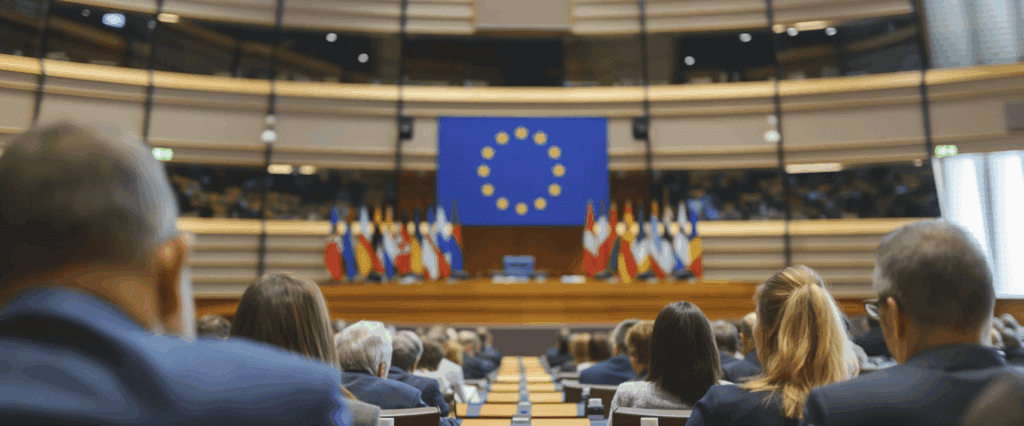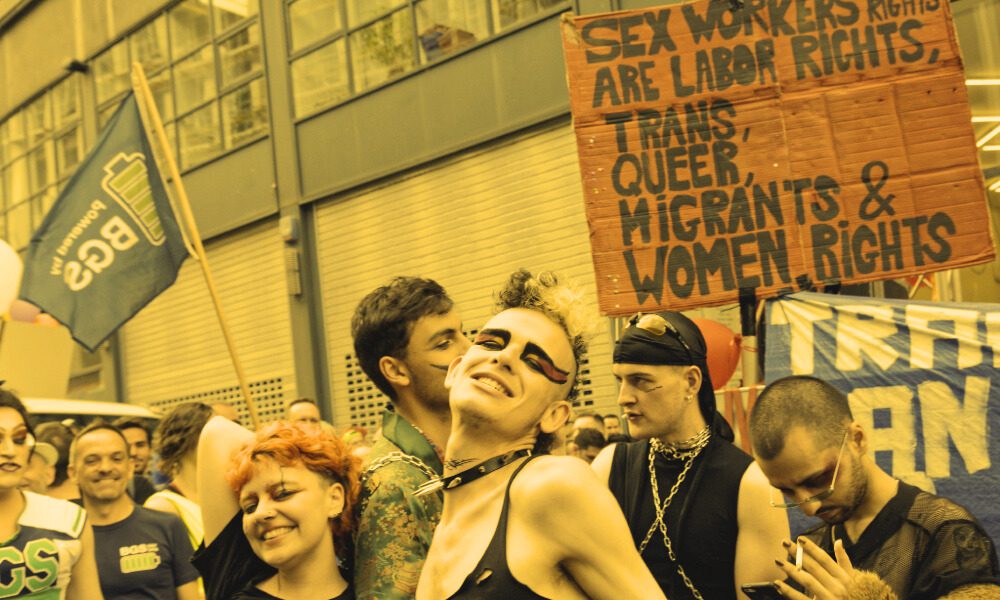Photo: Mama Cash/UTSOPI
In 1948, as the Universal Declaration of Human Rights was being drafted, its original title was the Universal Declaration of the Rights of Man. It was only after intervention from women delegates — notably Hansa Mehta of India and Minerva Bernardino of the Dominican Republic — that the final title became the Universal Declaration of Human Rights. Over seven decades later, that original impulse — to frame human rights around the priorities and interests of men — has re-emerged under a different name: sexual rights.
Nowhere in Europe is this more apparent than in Belgium. In 2024, under the banner of “modernisation” and the “decriminalisation of sex work”, the Belgian government effectively legalised the commercial management of prostitution. Though widely praised by international media as a progressive “world first”, the reforms in fact entrench male sexual access to women while empowering those who profit from their exploitation. Prostitution was never criminalised in Belgium; it was tolerated. What has changed is the legal status of those who organise, manage and monetise it.
In March 2022, Belgium reformed its Criminal Code in a way that legalised pimping. The reform did not decriminalise prostitution — it had never been criminalised — but it removed most third-party offences and redefined exploitation as simply the making of an “abnormal profit”, a term that remains undefined in law. In practice, this means that those who organise and profit from prostitution — commonly referred to as pimps — can now operate legally, provided their activities are formalised through contracts and presented as standard business arrangements. While countries such as Germany and the Netherlands maintain licensing systems for brothels, Belgium went further by removing restrictions on third-party profiteering altogether.
In 2024, Belgium expanded this framework by adopting a new law that formalised prostitution as a recognised form of employment under the labour code. Individuals in prostitution can now be hired through standard work contracts. Though presented as a protective measure, the law institutionalises pimping as legitimate employment and integrates the exploitation of prostitution — a practice prohibited under international law — into the formal economy.
To call prostitution “work” is to erase the inequality and violence that define it. In Belgium, as across Europe, the overwhelming majority of prostituted persons are migrant women — many undocumented or living in poverty — while buyers are almost exclusively men. Under the guise of protection, the new Belgian law normalises male sexual entitlement and transforms prostitution into a legitimate business.
This shift stands in direct contradiction to binding international standards.
- CEDAW (Article 6) obliges states to suppress the exploitation of the prostitution of women — in other words, pimping.
- The 1949 UN Convention recognises prostitution as incompatible with human dignity.
- The European Parliament has repeatedly identified prostitution as a form of violence against women and an obstacle to equality between women and men (2014 and 2023 Resolutions).
- UN Special Rapporteur Reem Alsalem has documented prostitution as a grave violation of women’s human rights.
The European Court of Human Rights recently affirmed that France’s Equality Model — which criminalises pimps and buyers while decriminalising prostituted persons — fully aligns with human rights obligations.
In response, nine feminist organisations in Belgium have brought a constitutional challenge against the law. These women’s rights groups argue that the “Law on Sex Work” violates core constitutional and human rights principles, including:
- Human dignity, by commodifying women’s bodies and reducing them to objects of sexual consumption.
- Equality between women and men, as prostitution both reflects and reinforces structural power imbalances between the sexes.
- Protection from violence and organised crime, given that prostitution fuels trafficking networks and exposes women to disproportionate levels of violence.
- Employment and labour law standards, by redefining sexual access to women as a form of contractual labour and legitimising third-party control over that transaction.
Following the submission of arguments by both parties, including the Belgian government’s defence, the court is expected to deliver its ruling in the coming months, a decision that will touch directly on the fundamental question of women’s human rights.
On the opposing side, several powerful, corporate-style NGOs — including ILGA-Europe, Transgender Europe (TGEU), Médecins du Monde and the International Planned Parenthood Federation (IPPF), among others — have intervened in support of the Belgian government. These organisations operate within a broader framework of ‘sexual and reproductive rights’ which — despite its stated support for women’s autonomy — has come to represent a shared political agenda: the legalisation of prostitution, the promotion of surrogacy, and the erasure of women as a sex-based class.
Within this framework, three well-funded lobbying interests converge: the transgender, prostitution and surrogacy lobbies. All three deny the material reality of sex and the structural nature of gender as a hierarchy of male dominance over women. Instead, they reframe systems of male power as matters of identity, expression or personal choice. In practice, this alliance legitimises male access to women’s bodies under the guise of “human rights”.
The case reveals a stark divide. On one side are feminist and frontline organisations providing daily support to women subjected to male violence, including those in prostitution and those trafficked for sexual exploitation. On the other stand influential, donor-fuelled NGOs united by an agenda that seeks to normalise male sexual entitlement — and to repackage it as progressive policy.
These organisations operate as part of a broader advocacy bloc that includes major international actors such as Amnesty International, which since 2015 has openly supported the legalisation of pimping. More recently, Amnesty has joined groups like the Centre for Reproductive Rights, IPPF, ILGA World and AWID in advocating for the regulation of women’s reproductive exploitation through surrogacy.
ILGA-Europe and Transgender Europe (TGEU) have promoted the same agenda, calling for the decriminalisation of third-party profiteering. All these organisations support the erasure of women in law and policy by replacing sex with stereotypes of gender and gender identity.
IPPF and ILGA recently attacked UN Special Rapporteur Reem Alsalem, claiming that “the notion of binary sex stems from Western colonial patriarchy.” In contrast, over 500 women’s organisations issued a joint letter defending Alsalem and her work documenting sex-based violence against women and girls.
Their intervention exposed a broader truth: under the banner of “human rights”, a network of high-profile and heavily resourced NGOs is advancing the interests of those who profit from the sexual and reproductive exploitation of women. What presents itself as progressivism is the consolidation of an industry — one that merges the prostitution lobby, the surrogacy market and the gender-identity movement into a single political force and a unified system of exploitation.
At its core is the belief that women’s bodies — sexually and reproductively — should be available for commercial use. What emerges is a global sexual-rights industry that rebrands male dominance as equality and exploitation as empowerment, while erasing women as a political and legal category altogether.
What Belgium now presents as progress is the return of an old pattern: the rights of men reasserted as universal.
In the same country where individuals can change legal sex through self-declaration — or remove it from legal documents altogether — and where sex-disaggregated data, including statistics on violence, have been erased, women as a political and legal class are vanishing. Crimes once recognised as male violence against women are now recorded based on self-declared “gender identity” rather than sex, erasing both male perpetrators and female victims from official records.
Under the banner of “human rights”, states and powerful NGOs are defending the sexual rights of men: the right to buy women, to rent women, to redefine women out of existence — and to call it equality and choice. Women fought to be recognised as human beings in 1948. In 2025, that struggle is far from over.
The feminist petitioners are: Isala, Le Monde selon les femmes, Observatoire féministe des violences faites aux femmes, Maison de la Famille, Synergie Wallonie pour l’égalité entre les femmes et les hommes, Mouvement pour l’Égalité entre les Femmes et les Hommes, Fondation Anne-Marie Lizin, European Network of Migrant Women, La Voix des Femmes.

